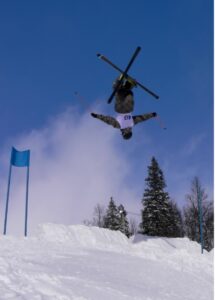Objectives
- Most of us strongly commit to making concrete changes at beginning of a New Year. Why can’t we follow through more consistently?
- The reason is because our behavioral patterns are so deeply ingrained. Just deciding to make a change won’t make it so.
- The commitment needed is to pursue aspects of your healing journey every day whether you are successful or not.
- The other commitment is a deeper one to keep moving forward towards your vision regardless of the obstacles.
- Then you have to trust your skills.
I was skiing on Christmas day, 2008, with my son Nick and his best friend Holt. Holt was the 2007 US mogul champion (bump skiing). My son had just won a national mogul event the two weeks earlier. The three of us were standing on top of a cornice at Snowbird, Utah. For non-skiers, a cornice is a snow formation that occurs at the top of a mountain ridge. As the wind blows the snow up the mountain a drop-off of 20-40 feet will be formed. Most skiers make a diagonal trail down this drop-off, which is fairly simple and safe. US ski team skiers often jump straight off of them.
Just below the cornice was a chute that was about 20 feet wide at the top but only about six feet wide about 2/3 of the way down. About 100 feet down on the left there was an outcropping of rocks, and it was about 200 feet before it opened up.

“Don’t attempt it!!”
While Holt was looking down at this chute, I said to him, “Holt, you are on the US ski team. I don’t think your coaches are going to be thrilled with you skiing down this kind of terrain.” He looked at me and immediately jumped into the chute. He skied about 75 feet straight down, made a gentle turn to the right, another gentle turn to the left and ended up in a large bowl. Nick started off to the right, jumped from a 15-foot cliff into the same chute and made the same turns into the bowl. They were traveling about 40-50 mph when they reached the open area. This was simply an undoable feat for most human beings. It was clear that if they did not remain committed to their decision that they had a high chance of a serious injury.
Practice, practice, practice – and trust yourself
They had been involved in competitive skiing for nine years. Each year, they had logged over 120 days on the slopes, worked on their jumping skills on water ramps in the summer, and exercised in the weight room several times per week. Every winter they spent the first few weeks on flat simple terrain honing basic turning techniques. They had supreme confidence to ski an icy mogul course at high speeds and had a strong commitment to excellence.

They each knew they could make that jump because they were supremely confident skiers and had done tough jumps before. So, when they made the jump into this steep chute, they were well within their capacity to execute the move. But at that moment, it also required them to commit.
Your life
Consider your life with regards to your capacity to effectively deal with adversity, pick yourself up when you fail, and keep moving forward. Unfortunately, most of us are not taught these skills in school, or within our families. Once we are out in the world, life becomes more competitive and the emphasis turns to survival, physically and emotionally.
Why not view your life from the perspective of an athlete, performing artist, or musician? There is a singular focus learning and mastering basics and acquiring additional expertise with repetition. Is your life any less important?
Recap
Commit to scheduling time daily with doable tasks that will stimulate your brain to change. Eventually, with repetition, these more functional behavioral patterns will become your baseline and you will be able to transform your life into one that you want. Don’t hesitate in your pursuit of your new life. It happens from connection, confidence, and commitment. Schedule it into your day.
The approach of the healing journey is not focused on “fixing” yourself. It is about acquiring skills to navigate adversity more effectively. You will spend less time in flight or fight physiology and your body and brain will heal.
Questions and considerations
- How confident are you in your capacity to navigate adversity?
- Did you ever consider it in terms of a learned skill?
- How committed are you to living an excellent life, regardless of the obstacles?
- We often have high expectations for our children or partners. What are your expectations of yourself? Are you the person you want your children to be?
- This series of questions is not about being perfect. We are all “flawed” and endlessly fall short of our expectations. The issue is, “what is your ongoing commitment to living a better life and being an example?”
- The problem is that while suffering from chronic pain, your energy becomes drained to the point that you may not care anymore. It is the reason that your commitment must begin with, “doing something” and keeping at it.
